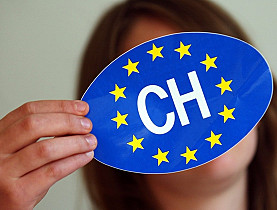
Passport-free air travel extends to 24 countries

Border controls at airports in eight eastern European countries and Malta were scrapped from midnight on Saturday for passengers flying within the Schengen zone.
Switzerland was due to join the Schengen zone in November this year, but the move is likely to be delayed as ratification of the treaty in several European Union member nations is still pending.
The abolition of controls for air traffic completes the latest enlargement of the Schengen zone to include nine new member states of the European Union. Sea and land frontiers have been open since December.
With the addition of Malta and the eight other countries – Estonia, Latvia, Lithuania, Hungary, Poland, Slovakia, Slovenia, the Czech Republic – some 400 million people can now travel by plane passport-free within 24 European countries.
The new Schengen members had to adapt their airport infrastructure to meet requirements from Brussels. The main change was to provide securely separated areas for passengers travelling between Schengen states and those travelling to or from other countries.
Several eastern European cities such as Warsaw, Prague and Budapest used the opportunity to modernise their airports and build new terminals.
The normal safety and identity checking procedures remain in place for air passengers in the nine new countries. Passengers will still have to carry valid identity documents.
Switzerland, which is not a member of the EU, was initially scheduled to join the Schengen zone last year.
Delays
But delays in the parliamentary ratification process in three EU countries have made it unlikely that the area will be extended to Switzerland before 2009.
Swiss voters approved the Schengen treaty in a nationwide vote in 2005.
Switzerland will have to implement technical and legal changes and the airports – the only remaining border post to non-Schengen countries – will have to be adapted. The cantonal authorities – in charge of security at airports – also have to train up their police units.
Switzerland will have to pay into a special Schengen fund set up by Brussels. In 2006 the government estimated the Swiss contribution at about SFr13 million ($11.3 million).
Bulgaria and Romania, who joined the EU on January 1 last year, are preparing to be included in the Schengen zone in 2011.
swissinfo with agencies
The Schengen Area comprises 24 countries, 22 of which are members of the EU. Iceland and Norway, member countries of the European Free Trade Asssociation (EFTA) are also in the zone and fellow ETFA members Switzerland and Liechtenstein are next in line to join, along with EU member Cyprus.
Britain and Ireland are not in the zone, but they have signed agreements on security.
A key element of the Schengen agreement is the Schengen Information Service (SIS), which includes a huge database in the French city of Strasbourg.
The SIS database enables police in any Schengen state to find out whether a suspect has been involved in any kind of crime across the EU.
The Schengen treaty takes its name from a town in Luxembourg where it was signed by Germany, France and the Benelux states in 1985.

In compliance with the JTI standards
More: SWI swissinfo.ch certified by the Journalism Trust Initiative

























You can find an overview of ongoing debates with our journalists here . Please join us!
If you want to start a conversation about a topic raised in this article or want to report factual errors, email us at english@swissinfo.ch.